文化苦旅英语书评
读文化苦旅有感精选15篇
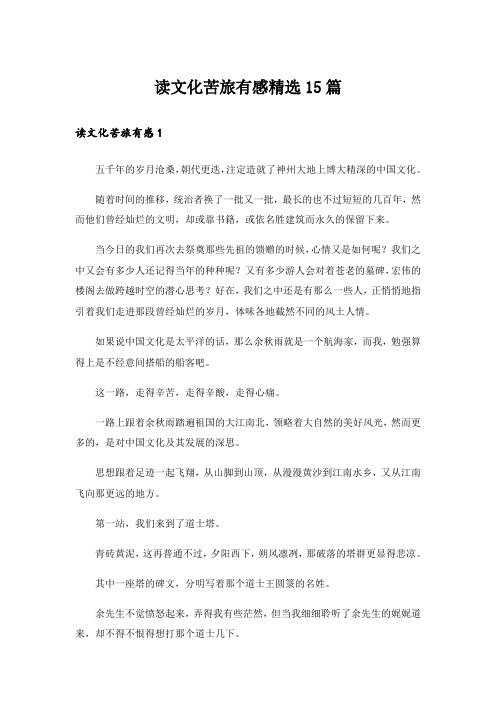
读文化苦旅有感精选15篇读文化苦旅有感1五千年的岁月沧桑,朝代更迭,注定造就了神州大地上博大精深的中国文化。
随着时间的推移,统治者换了一批又一批,最长的也不过短短的几百年,然而他们曾经灿烂的文明,却或靠书籍,或依名胜建筑而永久的保留下来。
当今日的我们再次去祭奠那些先祖的馈赠的时候,心情又是如何呢?我们之中又会有多少人还记得当年的种种呢?又有多少游人会对着苍老的墓碑,宏伟的楼阁去做跨越时空的潜心思考?好在,我们之中还是有那么一些人,正悄悄地指引着我们走进那段曾经灿烂的岁月,体味各地截然不同的风土人情。
如果说中国文化是太平洋的话,那么余秋雨就是一个航海家,而我,勉强算得上是不经意间搭船的船客吧。
这一路,走得辛苦,走得辛酸,走得心痛。
一路上跟着余秋雨踏遍祖国的大江南北,领略着大自然的美好风光,然而更多的,是对中国文化及其发展的深思。
思想跟着足迹一起飞翔,从山脚到山顶,从漫漫黄沙到江南水乡,又从江南飞向那更远的地方。
第一站,我们来到了道士塔。
青砖黄泥,这再普通不过,夕阳西下,朔风凛冽,那破落的塔群更显得悲凉。
其中一座塔的碑文,分明写着那个道士王圆箓的名姓。
余先生不觉愤怒起来,弄得我有些茫然,但当我细细聆听了余先生的娓娓道来,却不得不恨得想打那个道士几下。
道士塔本是佛教圣地,却不知为何交由如此一个浅薄势力的道士看管?看不惯“暗乎乎”、看着有点眼花的壁画,于是找了两个帮手,拎来几桶石灰,开始了它的粉刷。
从此那洞里什么也没有了,唐代的笑容,宋代的衣冠……洞中只剩下一片静白。
中座的塑雕过分耀眼,于是才几下,婀娜的体态变成了碎片,柔美的浅笑成了泥巴。
取而代之的是道士那粗制滥造的天师和菩萨。
有一天,道士发现了满满一洞的古物,于是这些珍贵的物件变成了他阿谀奉承的工具,那些古文物的清白也渐渐被抹黑。
更糟的是:外国友人的不客气,将中国古文物就此一车一车地安全运出国境,运到伦敦,运到巴黎,运到彼得堡,运到东京。
如此轻而易举。
文化苦旅书评
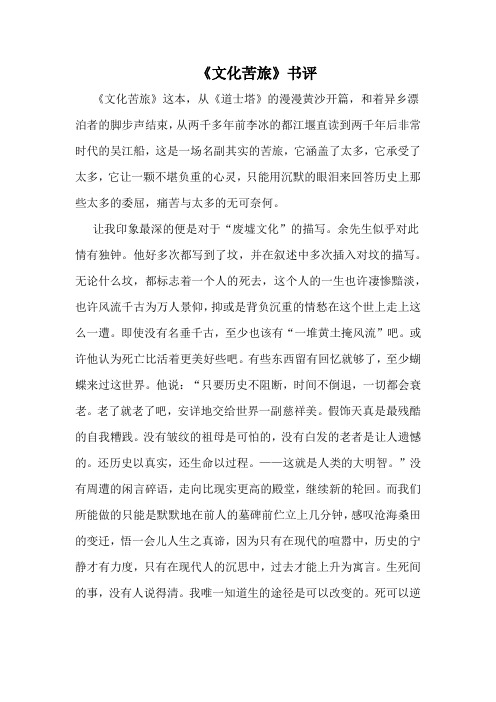
《文化苦旅》书评《文化苦旅》这本,从《道士塔》的漫漫黄沙开篇,和着异乡漂泊者的脚步声结束,从两千多年前李冰的都江堰直读到两千年后非常时代的吴江船,这是一场名副其实的苦旅,它涵盖了太多,它承受了太多,它让一颗不堪负重的心灵,只能用沉默的眼泪来回答历史上那些太多的委屈,痛苦与太多的无可奈何。
让我印象最深的便是对于“废墟文化”的描写。
余先生似乎对此情有独钟。
他好多次都写到了坟,并在叙述中多次插入对坟的描写。
无论什么坟,都标志着一个人的死去,这个人的一生也许凄惨黯淡,也许风流千古为万人景仰,抑或是背负沉重的情愁在这个世上走上这么一遭。
即使没有名垂千古,至少也该有“一堆黄土掩风流”吧。
或许他认为死亡比活着更美好些吧。
有些东西留有回忆就够了,至少蝴蝶来过这世界。
他说:“只要历史不阻断,时间不倒退,一切都会衰老。
老了就老了吧,安详地交给世界一副慈祥美。
假饰天真是最残酷的自我糟践。
没有皱纹的祖母是可怕的,没有白发的老者是让人遗憾的。
还历史以真实,还生命以过程。
——这就是人类的大明智。
”没有周遭的闲言碎语,走向比现实更高的殿堂,继续新的轮回。
而我们所能做的只能是默默地在前人的墓碑前伫立上几分钟,感叹沧海桑田的变迁,悟一会儿人生之真谛,因为只有在现代的喧嚣中,历史的宁静才有力度,只有在现代人的沉思中,过去才能上升为寓言。
生死间的事,没有人说得清。
我唯一知道生的途径是可以改变的。
死可以逆转吗?若有一智者活过百旬,他会做什么?若一个庸人活过百旬,他又会做些什么来?至于一个恶人就更不用说了。
原来散文,真的也可以写出历史的重量。
余秋雨先生的文采当然是好的,华彩明丽的辞藻,工整通畅的行文;但最吸引我的还是透过词句背后穿透历史迷雾的画面,越平凡质朴越令人动容。
王道士远望外国学者拉着满载敦煌文物大车的背影,天一阁门口及膝深的积水与楼阁上满地的枣核,牌坊下尼姑庵中那些腼腆年轻女老师们,布鞋踏在昔日牌坊上的雕纹上,送孩子们远去而挥动的小手绢,那两个为开了一冬的腊梅花瓣撑着紫绸伞的小护士……画面在一个人物身上定格,停顿一下,又跳到另一个场景上,再停顿。
文化苦旅书评
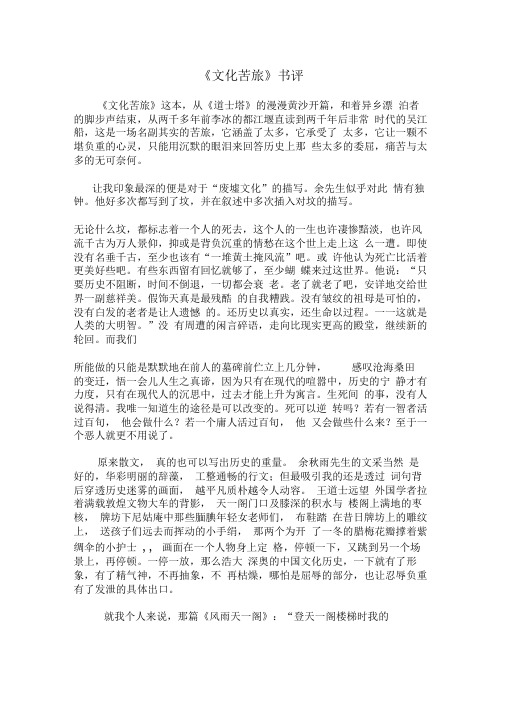
《文化苦旅》书评《文化苦旅》这本,从《道士塔》的漫漫黄沙开篇,和着异乡漂泊者的脚步声结束,从两千多年前李冰的都江堰直读到两千年后非常时代的吴江船,这是一场名副其实的苦旅,它涵盖了太多,它承受了太多,它让一颗不堪负重的心灵,只能用沉默的眼泪来回答历史上那些太多的委屈,痛苦与太多的无可奈何。
让我印象最深的便是对于“废墟文化”的描写。
余先生似乎对此情有独钟。
他好多次都写到了坟,并在叙述中多次插入对坟的描写。
无论什么坟,都标志着一个人的死去,这个人的一生也许凄惨黯淡, 也许风流千古为万人景仰,抑或是背负沉重的情愁在这个世上走上这么一遭。
即使没有名垂千古,至少也该有“一堆黄土掩风流”吧。
或许他认为死亡比活着更美好些吧。
有些东西留有回忆就够了,至少蝴蝶来过这世界。
他说:“只要历史不阻断,时间不倒退,一切都会衰老。
老了就老了吧,安详地交给世界一副慈祥美。
假饰天真是最残酷的自我糟践。
没有皱纹的祖母是可怕的,没有白发的老者是让人遗憾的。
还历史以真实,还生命以过程。
一一这就是人类的大明智。
”没有周遭的闲言碎语,走向比现实更高的殿堂,继续新的轮回。
而我们所能做的只能是默默地在前人的墓碑前伫立上几分钟,感叹沧海桑田的变迁,悟一会儿人生之真谛,因为只有在现代的喧嚣中,历史的宁静才有力度,只有在现代人的沉思中,过去才能上升为寓言。
生死间的事,没有人说得清。
我唯一知道生的途径是可以改变的。
死可以逆转吗?若有一智者活过百旬,他会做什么?若一个庸人活过百旬,他又会做些什么来?至于一个恶人就更不用说了。
原来散文,真的也可以写出历史的重量。
余秋雨先生的文采当然是好的,华彩明丽的辞藻,工整通畅的行文;但最吸引我的还是透过词句背后穿透历史迷雾的画面,越平凡质朴越令人动容。
王道士远望外国学者拉着满载敦煌文物大车的背影,天一阁门口及膝深的积水与楼阁上满地的枣核,牌坊下尼姑庵中那些腼腆年轻女老师们,布鞋踏在昔日牌坊上的雕纹上,送孩子们远去而挥动的小手绢,那两个为开了一冬的腊梅花瓣撑着紫绸伞的小护士,, 画面在一个人物身上定格,停顿一下,又跳到另一个场景上,再停顿。
哈克贝利费恩历险记英语读后感

哈克贝利费恩历险记英语读后感哈克贝利费恩历险记英语读后感Huckleberry Finn was a great literary work published in 1885 and written by Mark Twain. One of the most positive things about the book would be that the reading level is not very advanced and that it shows us a glimpse of the past. Along with the reading level not being very advanced, the book itself is extremely well thought out, and brings the stories, characters, and imagery to life. One of the negatives is the amount of cursing that takes place throughout the book. This is a negative because it is at a children"s reading level and it does not add any literary value to the book as a piece of history. The ugly but I believe necessary part of the book is the use of the n-word. This is a necessary part of the book because it shows to our children and everyone the meaning behind the word. If anything it makes the reader more understanding of the troubles that the slaves when though and understand the meaning of the word a little more deeply.This book was great, a masterpiece for the lack of words to describe how entirely wonderful it is. The book was a great classic, the only reason that I did read it is because we have to read a classic for school, however, now that I have read it I realize that it was a great book. I would read this book two or three times, and I do not like reading books again. The book was really able to portray the idea of childhood innocence and foolishness in the book, especially the end. I thought that this book was really an eye opener for people who may think that life is not worth living or maybe derpessed. Because, as you can see, Huck was a young boy who had an alcoholic father who beat him all the time, even kidnapped him after he was adopted by other people. Huck evendecided to run away from his father, yet he is still a young, fun loving kid in the end, especially when Tom reveals to him how the whole trip was just a game. The only thing I have to say against the book is that it did seem a little racist with its words, however maybe this is just how they talked in that time period? Overall a great read that I highly reccomend.。
文化苦旅英语读后感

文化苦旅英语读后感English answer:Yu Hua's "Cultural Pilgrimage" is a thought-provoking and deeply personal account of the author's journey through some of China's most significant cultural sites. Through his vivid descriptions and insightful observations, Yu Hua explores the complex relationship between history, culture, and individual identity.The book is divided into seven chapters, each focusing on a different cultural site. Yu Hua begins his pilgrimage at the Terracotta Warriors of Xi'an, where he marvels at the sheer scale and artistry of the figures. He thentravels to the Great Wall, where he contemplates the wall's role in both protecting and dividing China. Subsequent chapters take him to the Forbidden City, the Temple of Heaven, the Confucius Temple, the Yellow Mountain, and the Yangtze River.Yu Hua's writing is both lyrical and incisive. He has a keen eye for detail, and his descriptions of the cultural sites he visits are both evocative and informative. He also does not shy away from expressing his own opinions, and the book is full of thought-provoking insights into Chinese history and culture.One of the most striking things about "Cultural Pilgrimage" is Yu Hua's willingness to challenge conventional wisdom. He questions the official narratives surrounding many of the cultural sites he visits, and he offers his own interpretations of their significance. This willingness to think independently makes "Cultural Pilgrimage" a valuable and refreshing read.In addition to its historical and cultural insights, "Cultural Pilgrimage" is also a deeply personal book. Yu Hua writes about his own experiences and reflections, and he uses the cultural sites he visits as a way to explore his own identity. The book is full of moving and insightful passages, and it offers a unique glimpse into the mind of one of China's most important contemporary writers.Overall, "Cultural Pilgrimage" is a superb piece of writing that is both informative and thought-provoking. Yu Hua's insights into Chinese history and culture are invaluable, and his personal reflections add a furtherlayer of depth to the book. Highly recommended.中文回答:余华的《文化苦旅》是一部发人深省且具有深刻个人意义的作品,讲述了作者游历中国部分重要文化遗址的旅程。
文化苦旅读后感英语100字

文化苦旅读后感英语100字English: "After reading 'Cultural Struggles,' I was struck by the powerful portrayal of the challenges and hardships faced by individuals navigating different cultural worlds. The book effectively highlights the complexities of cultural identity, shedding light on the internal conflicts and external pressures experienced by those who find themselves torn between traditions and modernity. Through the compelling stories of the characters, the author skillfully exposes the tensions between personal desires and societal expectations, as well as the struggles for acceptance and belonging in a rapidly changing world. This thought-provoking novel not only explores the impact of cultural clashes on individuals but also prompts readers to reflect on their own cultural experiences and contemplate the significance of embracing diversity and understanding across cultures."中文翻译:阅读《文化苦旅》后,我被描绘出个体在不同文化世界中导航时所面临的挑战和困难所震撼。
文化苦旅读后感英语100字
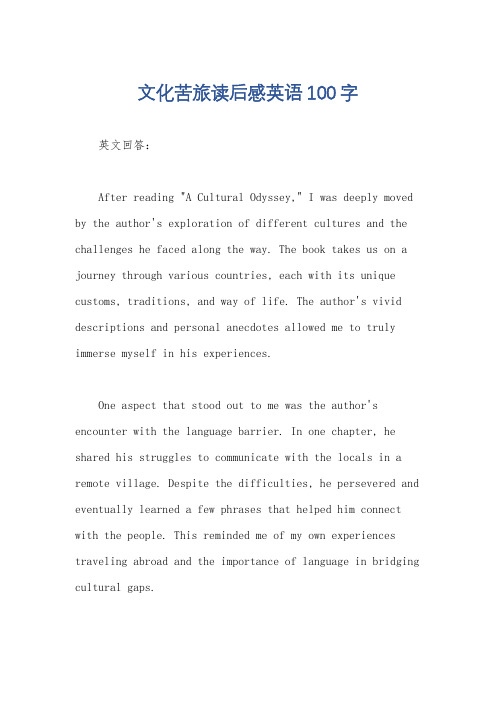
文化苦旅读后感英语100字英文回答:After reading "A Cultural Odyssey," I was deeply moved by the author's exploration of different cultures and the challenges he faced along the way. The book takes us on a journey through various countries, each with its unique customs, traditions, and way of life. The author's vivid descriptions and personal anecdotes allowed me to truly immerse myself in his experiences.One aspect that stood out to me was the author's encounter with the language barrier. In one chapter, he shared his struggles to communicate with the locals in a remote village. Despite the difficulties, he persevered and eventually learned a few phrases that helped him connect with the people. This reminded me of my own experiences traveling abroad and the importance of language in bridging cultural gaps.Another theme that resonated with me was the author's exploration of food and cuisine. He described in great detail the flavors, aromas, and textures of the dishes he tried in different countries. It made me realize how foodis not only a means of sustenance but also a reflection of a culture's history, values, and identity. It made me appreciate the diversity of culinary traditions around the world and inspired me to try new dishes myself.Furthermore, the book delved into the author's encounters with various religious practices and beliefs. He shared his observations and interactions with people of different faiths, shedding light on the role of religion in shaping societies and individuals. It made me reflect on my own beliefs and the importance of respecting and understanding different religious perspectives.Overall, "A Cultural Odyssey" left a lasting impression on me. It reminded me of the beauty and complexity of our world, and the importance of embracing diversity and cultural exchange. It made me appreciate the power oftravel in broadening our horizons and deepening ourunderstanding of others. I would highly recommend this book to anyone interested in exploring different cultures and gaining a deeper appreciation for our global community.中文回答:《文化苦旅》一书让我深受触动。
文化苦旅英语读后感
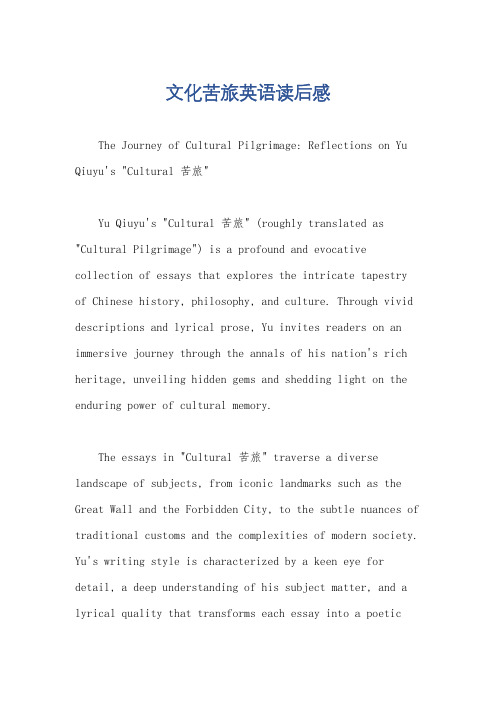
文化苦旅英语读后感The Journey of Cultural Pilgrimage: Reflections on Yu Qiuyu's "Cultural 苦旅"Yu Qiuyu's "Cultural 苦旅" (roughly translated as "Cultural Pilgrimage") is a profound and evocative collection of essays that explores the intricate tapestry of Chinese history, philosophy, and culture. Through vivid descriptions and lyrical prose, Yu invites readers on an immersive journey through the annals of his nation's rich heritage, unveiling hidden gems and shedding light on the enduring power of cultural memory.The essays in "Cultural 苦旅" traverse a diverse landscape of subjects, from iconic landmarks such as the Great Wall and the Forbidden City, to the subtle nuances of traditional customs and the complexities of modern society. Yu's writing style is characterized by a keen eye for detail, a deep understanding of his subject matter, and a lyrical quality that transforms each essay into a poeticmeditation.One of the most striking aspects of "Cultural 苦旅" is Yu's ability to breathe life into historical figures and events. In the essay "The Wall," for instance, he vividly portrays the arduous construction of this colossal structure, evoking the sweat and toil of countless laborers and the unyielding spirit of the Chinese people. Similarly, in "The Forbidden City," he delves into the opulent world of imperial China, shedding light on the complexities of court life and the enduring legacy of the Ming and Qing dynasties.Beyond the historical realm, Yu also examines the cultural traditions and beliefs that have shaped Chinese society. In the essay "Tea," he explores the deep-rooted significance of this beverage in Chinese culture, delving into its origins, its role in daily life, and its symbolism as a bridge between people. In "The Chinese Garden," he celebrates the intricate beauty and philosophical underpinnings of these serene spaces, highlighting their function as microcosms of the natural world and places ofcontemplation.However, Yu's exploration of Chinese culture is not confined to its traditional manifestations. He also confronts the challenges and complexities of modern Chinese society in essays such as "The Subway" and "The Internet." Through these works, he addresses the rapid urbanization, technological advancements, and cultural shifts that have transformed China in recent decades.Throughout "Cultural 苦旅," Yu's writing is imbued with a deep sense of patriotism and reverence for Chinese culture. He does not shy away from addressing China's shortcomings, but ultimately his essays are a celebration of the resilience, creativity, and profound wisdom of his nation."Cultural 苦旅" is not merely a travelogue or a collection of historical accounts. It is a profound meditation on the nature of cultural heritage and its transformative power. Yu's essays invite readers to confront their own cultural assumptions, to appreciate thebeauty and depth of different civilizations, and to recognize the shared human experiences that unite us all.In the end, "Cultural 苦旅" is not just a book to be read and enjoyed; it is a journey to be embarked upon. Through Yu Qiuyu's lyrical prose and insightful observations, readers are transported to a world rich in history, culture, and profound philosophical truths. It is a journey that will deepen one's understanding of China, broaden one's cultural horizons, and leave an indelible mark on the soul.。
- 1、下载文档前请自行甄别文档内容的完整性,平台不提供额外的编辑、内容补充、找答案等附加服务。
- 2、"仅部分预览"的文档,不可在线预览部分如存在完整性等问题,可反馈申请退款(可完整预览的文档不适用该条件!)。
- 3、如文档侵犯您的权益,请联系客服反馈,我们会尽快为您处理(人工客服工作时间:9:00-18:30)。
Cultural Perplexity in Agonized Travel If I owe the crush of Luxun to his scorching words before ,however, it is the inner aspiration to the beauty from my inner heart to the Yuqiuyu this time .Yuqiuyu with his beautiful ink ornament literary this branch, the snow DongMei proud snow, a little red in the us in the mountainsPush open the door of the study, epuipped with maps ,packs, a feeling beyond comparison to describe after u step out the zeitlich and return back to the humanistic landscapes. You are gonna have to close ur eyes at length ,returning back to history indifference and rational severe no matter u are in mild spring or bleak autumn, great joy or great indignation.Actually, real hometowns do not exist. so called hometowns is just a place to end our ancestors' longtime drifting journey in their lives. Being a drifting journey, each lingering does not indicate the end of a new start. as Luxun said :there is no road in the world until more people walking, maybe the beauty in the world was discovered by the people.Yu qiuyu with his unique writing glamour attracts people, that's a combination of bitter memories and anxious knowing ,post-relaxation and juvenescence of being old.We cannot use a honor to portray him unique pen rhyme,the icy analysis and the travel's hardship.walking is not a easy job ,whereas writing down what u saw is harder. YuPa prose with his aesthetic yet rational eye to re-examine the history, reviewing humanistic landscapes. it is this drifting andwandering that arouse our inmost simplicity and unique personality charm.Pull out a wicker, ripp off a peach sticks. have a cup of green tea, read a good book.It is my senior year in high school that i read this book and time was limited at that moment.i did not have a clear way to get this book in my desk but i read it from then on.This is the culture essays. It is mainly through landscape custom to explore cultural soul, the true meaning of life, the history of Chinese culture and Chinese literati's personality constitutes.both the historical deep performance showed desolation, and the jiangnan culture fresh graceful and restrained .it demonstrate the difficultiesjourney of Chinese literaticy as well as the disclosure of human relationships. It is found that the author not only have a rich culture, also have the keenness of special artistic expression.Mr. Yu qiuyu of this book is a cultural man‘s analysis of reality and regretment of culture.the author carries the burden of "culture"traveling,spoiling for wakening the sleeping culture, but silenced by the real world again and again.Standing in each cultural Gideon depths, he is always in the recounting, recounting, carrying on absolute sincerity to culture, recouting along the way...In this book , I still prefer the three gorges ", "snow", "Wolf Yang foot","liuhou temple", "jiangnantown."etc . among them three gorges are my favorite one.it starts from baidicheng.the beginnging of three gorges is baidicheng is natural for most literate chinese .the three gorges is ever culture for a witness to history is also a place "interesting place".There's li bai's literary grace romantic, "TuoGu" backup and filled with sadness. Poetry and war, heroic and ShenYu of natural beauty, the domination of pilgrimage and chief of rivers. Culture is so is recorded, and the record and the culture itself added in.Say so many we experience a few pieces of Yu Qiuyu teacher's Cultural Perplexity in Agonized Travel.1.Water cold biting, who trembled. First, those who cut off a reed reed, the most beautiful taihu lake taihu lake, who cannot leave is inseparable from their reeds. Stay at the bottom DaoJi reed root eg, most people's feet were pierced bleeding. The muddy waters of the deep in the lake to swing between puffs of taihu lake, like in bleeding.《吴江船》2.Such a large Chinese, but not several rolls with scripture! By officials in large than the scenario, I sometimes them even wants to cruel say: would rather stored in the museum of London! This sentence ultimately isn't very comfortable. Was I stopped team, actually should sail to where? Here also difficult, there is also difficult, I can only make it staying in the desert, and then cry.<<道士塔>>3.The vast desert in the world, words flowing water, is black and white. But such a bay, desert sand so a quiet, desolate in such a scene, after a fall, illimitable only so deep of heaven and earth, the condition of the cleverness, metrical lets a person god drunk feeling gallop. This push diffraction, life, world, history, none so. To float clamour to calm, with halcyon with cools, to rush to level, to such straightforward to bright and beautiful. As such, life only saw clever, the world can be delicate, history just have charm. However, People's Daily used, are a wide variety of one-way hyperbole. Even the god of nature also thick rough rough, too lazy to fine add allocate, by its tired to world.《沙原隐泉》ndscape is, the monuments, seems to spirit also has trifling retained. A recent to suzhou, revisit HanShanSi and crashed a few bell, because YuYue ShiBei and thought of the QuYuan inscribed. QuYuan for new open, because there are flat, as he later Mr Donated original colony, optimum bosom. QuYuan in a narrow alleyway in the room, because this common existence of Turin, suzhou late qing dynasty had become a Chinese towns. The suzhou very calm at the alleys, but numerous in Turin, and many of the innumerable, hiding the soul of thick. It is these souls, for thousands of years, in order to accumulate the stubborn old, the core of preserved the charm of suzhou.《白发苏州》I feel very sad, because I can't very accurate translation, can use computerprograms. I will not bear down again, I feel this translation is a kind of art to insult. I'm so sorry Yu Qiuyu teacher. I'm so sorry my lover Cultural Perplexity in Agonized Travel.Liu Junhong(200900111073)The 2011 on April 20th Teams show and evaluation :李如昕:Although Yu Qiuyu is written in Chinese characters, but your English comments than his literary writing is not poor, statements very beautiful.王道亮:Nothing can say,just so good!王玉露:Never thought of a collection of essay can have such depth ,the article whether to write much good, also need a man took his good dug out.房宏宇:So beautiful!。
